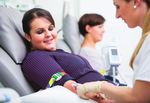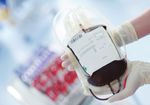PHLEBOTOMY TECHNICIAN - Health Sciences Division
←
→
Page content transcription
If your browser does not render page correctly, please read the page content below
PHLEBOTOMY TECHNICIAN
Health Sciences Division 2020-2021
A phlebotomist has a vital role in the healthcare
system. Phlebotomists may work in free-standing
laboratories, hospitals, clinics, physicians’ offces,
home care areas and blood donation centers.
Additionally, phlebotomists may be cross-trained as
patient care technicians. The average annual salary
for a phlebotomist according to the Bureau of Labor
Statistics (2018) is $34,400.
A phlebotomy technician performs dermal and
venipuncture techniques to collect blood specimens
necessary in the diagnosis and treatment of a client.
In addition to blood collection skills, successful
specimen collection requires a phlebotomist to
demonstrate competence, professionalism, and good
communication and public relations skills. Moreover,
the phlebotomist may perform point-of-care testing,
obtain non-blood specimens for analysis, process and The requirements for a clinical externship include:
transport specimens, and maintain safety and quality 1. Passing HLTSC 158 (Phlebotomy Basics) with a
control procedures. The aforementioned procedures, grade of “C” or better.
as well as anatomy and physiology, communication, 2. HLTSC 158 (Phlebotomy Basics) and HLTSC
legal, ethical and professional concepts related to the 159 (Phlebotomy II) must be taken in consecutive
role of the phlebotomist will be studied in this program. semesters. Deviations from this sequence may
The phlebotomy certifcate program consists of only be made with appropriate approval of the
two classes. HLTSC 158 (Phlebotomy Basics) is a instructor and division dean offering the course.
six-credit hour course that includes the theory of 3. Immunizations and examinations at the student’s
phlebotomy as well as laboratory skills experience in expense to ensure that the student can meet the
the classroom. HLTSC 159 (Phlebotomy II) is a four- technical standards of the program.
credit hour course and includes theory, a computer 4. An active American Heart Association
component, a 120-hour clinical externship at a cardiopulmonary resuscitation (CPR) certifcate for
CMS-approved and accredited laboratory facility, and professional rescuer of infant, child and adult.
preparation to take the American College for Clinical 5. Students admitted to health science programs
Pathology national phlebotomy certifcation exam. must consent to background/security checks
including a criminal background check and drug
screening. The student is responsible for any
cost associated with the background/security
checks. Students that require additional drug
testing beyond initial screening and/or medical
review may be responsible for associated costs.
Certain criminal convictions may render a student
ineligible to train at clinical sites which are
necessary in order to successfully complete the
program. Additionally, certain criminal convictions
may render an individual ineligible to take the
licensing/certifcation exam or to be licensed/
certifed in the State of Michigan. The college will
review the results and determine, on a case-by-
case basis, whether to deny admission to any
individual based on the results of the criminalPHLEBOTOMY TECHNICIAN
background check and drug screening. Students 10. In addition to college rules, phlebotomy technician
that require additional drug testing beyond students are required to adhere to policies and
initial testing and/or a medical review may be procedures outlined in the Phlebotomy Technician
responsible for associated costs. Student Handbook provided in HLTSC 158
6. Phlebotomy students are required to have (Phlebotomy Basics).Students must be available
professional liability and personal health to work 120 hours in consecutive days as part
insurance. The professional liability insurance is of the clinical externship which is part of HLTSC
provided by the college. Personal health insurance 159 (Phlebotomy II). Students must be aware
must be obtained by the student and maintained that afternoon shifts cannot be guaranteed for
throughout both courses in the program, HLTSC the clinical externship. The clinical externship
158 (Phlebotomy Basics) and HLTSC 159 will be arranged by the phlebotomy instructor in
(Phlebotomy II). Proof of insurance will be required a CMS-regulated laboratory facility. The clinical
prior to participating in any lab or clinical activity. externship will be completed without monetary
7. Students who wish to review or enhance compensation.
phlebotomy skills may elect to take HLTSC Note: Any expense accrued for the above requirements is the responsibility of
158 (Phlebotomy Basics) and not HLTSC 159 the student.
(Phlebotomy II), but a certifcate will not be Technical Standards
awarded. The purpose of the technical standards is to inform
8. Students must complete the necessary students choosing to enter into a health occupation
prerequisites before the beginning of a clinical program of the basic minimal technical standard
rotation. Each student must pass both the lab and requirements that must be met in order to complete
theory portion of HLTSC 158 (Phlebotomy Basics) all course work objectives and student outcomes.
with a “C” average (78 percent) or better to be The listed standards encompass what is minimally
eligible for a phlebotomy externship, HLTSC 159 required to perform necessary tasks. This list is not
(Phlebotomy II). exhaustive, and can be modifed as the college deems
9. The student must complete both HLTSC 158 necessary at any time. Students enrolled in a health
(Phlebotomy Basics) and HLTSC 159 (Phlebotomy occupation program at MCCC must provide care
II) with a “C” average or better in order to be that is safe and effective. These technical standards
awarded the phlebotomy technician certifcate. apply to any student enrolling in any one of the health
occupations programs. The student must be able
to demonstrate suffcient cognitive, professional,
motor (physical), sensory, and other abilities, with or
without accommodation, to meet program technical
standards. Technical standard requirements are
listed below. Examples of tasks associated with each
requirement and standard are available for review by
visiting the Health Sciences Division section of the
MCCC website. Prospective students are encouraged
to review the Technical Standards for Health
Occupational Programs document in its entirety prior
to enrolling in or applying to any health occupation
course or program.
• Critical Thinking and Cognitive Competencies:
Sufficient critical thinking and cognitive abilities in
classroom and clinical settings.
• Professionalism:
Interpersonal skills sufficient for professional
interaction with a diverse population of individuals,
families, and groups.
• Communication:
Communication sufficient for professional
interactions.
• Mobility:
Physical abilities sufficient for movement from room
to room and in small spaces.PHLEBOTOMY TECHNICIAN
• Motor Skills: reasonable accommodations to meet these standards.
Gross and fine motor abilities which are sufficiently The college will provide appropriate accommodations,
effective and safe for providing allied health care.
but it is not required to fundamentally alter the
• Sensory: requirements or nature of the program, or lower its
Auditory and visual ability sufficient for observing,
monitoring, and assessing health needs. academic standards. Requests for accommodations
should be directed to a Disability Services counselor in
• Observation:
Ability to sufficiently make observations in a the Student Success Center. To make an appointment,
health care environment, consistent with program please call 734.384.4167.
competencies.
Required Courses Credits
• Tactile sense: HLTSC 158 (Phlebotomy Basics) . . . . . . . . . . . . . . . . . . . . . 6
Tactile ability sufficient for physical assessment. HLTSC 159 (Phlebotomy II). . . . . . . . . . . . . . . . . . . . . . . . . . 4
A prospective student or participant in the program Total Certifcate Requirements 10 credits
with an approved documented disability can request Total Certifcate Cost 17 minimum billable
contact hours
Information contained within this document is subject to change. This program sheet may not be considered as an agreement or contract.
Monroe County Community College is an equal opportunity institution and adheres to a policy that no qualifed person shall be discriminated
against because of race, color, religion, national origin or ancestry, age, gender, marital status, disability, genetic information, sexual orientation,
gender identity/expression, height, weight or veteran’s status in any program or activity for which it is responsible. If you have a disability and
need special accommodations, please contact the Student Success Center (734.384.4167) at least 10 business days prior to the frst class
session to begin the accommodation process.
The college’s Equal Opportunity Offcer and Title IX and Section 504/ADA Coordinator and Compliance Offcer
for discrimination and sexual harassment is the Director of Human Resources,
Monroe County Community College, 1555 South Raisinville Road, Monroe, Michigan 48161, 734.384.4245.
Monroe County Community College is accredited by the Higher Learning Commission, www.hlcommission.org, 800.621.7440.
Main Campus Whitman Center
1555 South Raisinville Road 7777 Lewis Avenue
Monroe, Michigan 48161 Temperance, Michigan 48182
734-242-7300 / 1-877-YES-MCCC 734-847-0559
www.monroeccc.edu Admissions: 734-384-4104You can also read






















































